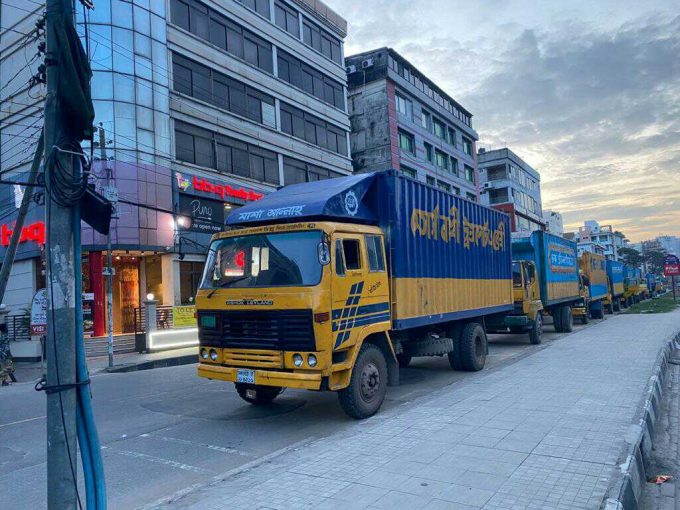Container spot rates have peaked as all major trades see prices fall
There was more evidence in this week’s container port freight markets that peak prices on ...
TFII: SOLID AS USUALMAERSK: WEAKENINGF: FALLING OFF A CLIFFAAPL: 'BOTTLENECK IN MAINLAND CHINA'AAPL: CHINA TRENDSDHL: GROWTH CAPEXR: ANOTHER SOLID DELIVERYMFT: HERE COMES THE FALLDSV: LOOK AT SCHENKER PERFORMANCEUPS: A WAVE OF DOWNGRADES DSV: BARGAIN BINKNX: EARNINGS OUTODFL: RISING AND FALLING AND THEN RISING
TFII: SOLID AS USUALMAERSK: WEAKENINGF: FALLING OFF A CLIFFAAPL: 'BOTTLENECK IN MAINLAND CHINA'AAPL: CHINA TRENDSDHL: GROWTH CAPEXR: ANOTHER SOLID DELIVERYMFT: HERE COMES THE FALLDSV: LOOK AT SCHENKER PERFORMANCEUPS: A WAVE OF DOWNGRADES DSV: BARGAIN BINKNX: EARNINGS OUTODFL: RISING AND FALLING AND THEN RISING

Air freight rates from Bangladesh have almost doubled in the past month, with rates to the US now at about $12 per kg, to Europe $5 per kg and $4.25 to the Far East, according to local forwarders.
A month ago the rates were $6-$7 to the US, less than $4 to Europe and about $1.5 to the Far East.
Freight forwarders blame the rate rises on higher demand than capacity, scanner malfunction at Dhaka Airport, sea route volatility, Christmas-linked demand for apparel and the return of normalcy in business globally.
And as demand has grown, the cargo village at Hazrat Shahjalal International Airport in Dhaka has been unable to process shipments, resulting in hundreds of trucks waiting on roads and highways in adjacent areas, creating logjams.
Nurul Amin, MD at Tower Freight Logistics, said the airport authority was reluctant to resolve the air cargo backlog and other related problems.
“Trucks are waiting outside the cargo village for two to three days to unload cargo due to mismanagement,” he told The Loadstar, adding that aircraft were flying without at least 20% of their shipments, due to a failure to hand over cargo in time.
That, along with volatility in sea routes, has added to the pressure on freight rates, he said.
Syed Md Bakhtiar, VP of the Bangladesh Freight Forwarders Association (BAFFA), said the malfunction of the scanners had deepened the crisis at the airport.
And Mohammad Hatem, first VP of the Bangladesh Knitwear Manufacturers and Exporters Association (BKMEA), said apparel producers needed air freight to meet emergency requirements, with sea freight delayed and experiencing various complications.
“But our cargo-laden trucks are forced to wait outside the cargo village for days, impeding our efforts to quickly send goods,” he said.
Mr Hatem added that as stores re-opened round the world, buyers were demanding that manufacturers send goods as fast as possible. And some buyers were now sharing air shipment costs in order to get goods stored in warehouses ahead of winter and Christmas.
Comment on this article